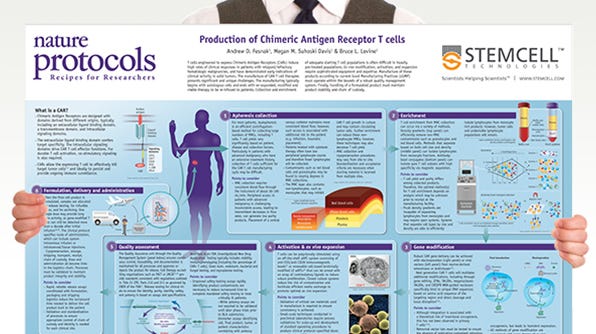The store will not work correctly when cookies are disabled.
JavaScript seems to be disabled in your browser.
For the best experience on our site, be sure to turn on Javascript in your browser.
Immuno-Oncology
Immune cells have the capability to eliminate tumor cells; however, tumor cells can develop the ability to evade immune responses. Current research efforts have been focused on developing personalized strategies for cancer treatment and developing new therapies that bolster the immune response in the fight against tumor cells.
Below is a collection of scientific resources for your immuno-oncology research.
Featured
This free Nature Protocols Wallchart summarizes the processes involved in producing CAR T cells for therapy.
Get Your Free Copy >
Products 25 to 36 of 82 total
Products 25 to 36 of 82 total
Shop By
Filter Results
Resource Type
Interview 4
items
Podcast 7
items
Protocol 3
items
Scientific Poster 8
items
Tech Tip 16
items
Technical Bulletin 4
items
Video 19
items
Wallchart 3
items
Webinar 18
items
Product Type
6
items
Cell Culture Media and Supplements 11
items
Cell Engineering and Molecular Tools 1
item
Cell Isolation Products 42
items
Instruments and Software 2
items
Primary and Cultured Cells 2
items
Tissue and Cell Culture Dissociation Reagents 1
item
Area of Interest
19
items
Cancer 17
items
Cell Therapy Development 13
items
Chimerism 3
items
Disease Modeling 2
items
Drug Discovery and Toxicity Testing 6
items
Extracellular Vesicle Research 1
item
HIV 8
items
HLA 7
items
Immunology 52
items
Infectious Diseases 4
items
Organoids 2
items
Stem Cell Biology 5
items
Transplantation Research 1
item
Brand
0 11
items
ArciTect 2
items
CellPore 2
items
EasySep 40
items
HetaSep 1
item
ImmunoCult 8
items
Lymphoprep 1
item
RoboSep 1
item
RosetteSep 3
items
STEMdiff 2
items
STEMprep 1
item
StemSpan 1
item
Cell Type
25
items
B Cells 11
items
Cancer Cells and Cell Lines 2
items
Dendritic Cells 9
items
Endothelial Cells 1
item
Epithelial Cells 3
items
Granulocytes and Subsets 3
items
Hematopoietic Stem and Progenitor Cells 4
items
Hepatic Cells 1
item
Innate Lymphoid Cells 5
items
Intestinal Cells 3
items
Leukocytes 2
items
Leukopaks 1
item
Lymphocytes 16
items
Macrophages 4
items
Monocytes 11
items
Mononuclear Cells 8
items
Myeloid Cells 4
items
Myeloma 1
item
NK Cells 14
items
Neurons 1
item
Pancreatic Cells 1
item
Plasma 1
item
Platelets 1
item
Pluripotent Stem Cells 1
item
Red Blood Cells 1
item
T Cells 36
items
T Cells, CD4+ 9
items
T Cells, CD8+ 13
items
T Cells, Other Subsets 4
items
T Cells, Regulatory 11
items
Tumor Cells 4
items
Whole 1
item

